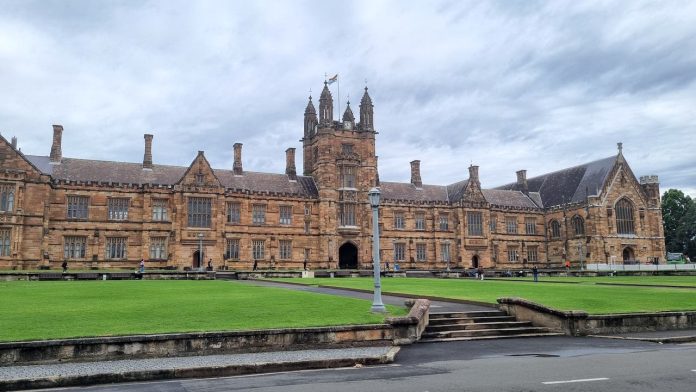It’s been a year since the Israel-Gaza conflict.
A year since Hamas launched a surprise attack on Israel from Gaza, taking 251 hostages and killing 1200 Israelis. The attack is deemed to be the “deadliest” in Israel’s history.
In retaliation, Israel launched one of the “most destructive” airstrike campaigns in modern history” and a full-scale invasion of Gaza on Octobern 27, killing thousands of Palestinians.
The conflict has continued, with more than 41,870 Palestinian and 1,139 Israeli deaths a year later on October 7, 2024.
In Sydney, thousands rallied from Hyde Park on October 6 and joined a candlelight vigil on October 7 to commemorate the 1-year anniversary of the Israel-Gaza conflict. But the lead-up to what’s seemingly “just another Sydney protest” was far from easy.
On October 1, NSW Police launched a Supreme Court action to ban the two-day demonstrations organised by the Palestine Action Group.
NSW Police referenced safety reasons for its prohibition. In particular, it highlighted tendencies about an overly large crowd size and potential hazards including “planter boxes” at Town Hall. It also mentioned prohibited items such as Hezbollah flags brought to the past weeks’ rallies, and alleged there had been a rise of “aggressive” protesters. It also expressed concerns over the rally’s proposed march route, explaining that it would bring protesters close to the Great Synagogue on Elizabeth Street in their retreat to Hyde Park, which they argued could be “provocative”.
Both the rally and the vigil were approved after an 11-hour-long Supreme Court hearing on October 3 – with altered routes avoiding the Great Synagogue, and on the condition that the protesters agreed to not display any flags, portraits, or symbols linked to prohibited terrorist organisations.
The proceeding of the two events marks a hard-won victory for freedom of speech for the Palestine Action Group and pro-Palestinian protesters. But balancing free speech with public safety and social harmony remains a challenge throughout Australia. And educational institutions are not exempted from this dilemma.
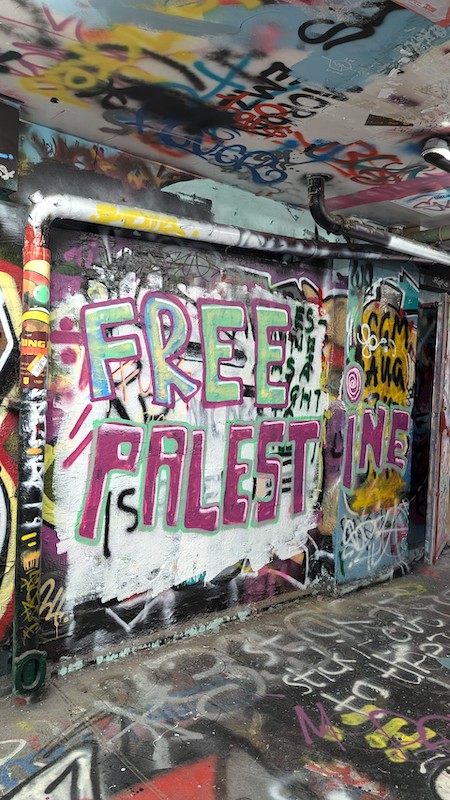
A Microcosm of Australian Society: The University of Sydney
In step with universities across Europe and the US, campuses across Australia set up pro-Palestinian encampments since the end of April, demanding their universities cut ties with Israeli institutions and weapons manufacturers.
Following a Senate inquiry into anti-Semitism on campus on September 20, University of Sydney Vice-Chancellor Mark Scott apologised to Jewish students and staff, admitting he ‘failed them’ in his handling of the pro-Palestinian student encampment.
“The testimonials are heartbreaking and unacceptable and for that I am sorry,” he said.
Reports of Jewish students feeling unsafe during the eight-week ‘Students for Palestine’ protests at the university prompted the Senate inquiry. There were also claims of rising anti-Semitism in other university campuses as pro-Palestinian encampments grew.
Scott finds himself caught between the crossfires of meeting the demands of pro-Palestinian activists and those of some Jewish groups and federal opposition MPs demanding his resignation.
What started the fire?
Prior to concerns about the spread of anti-semitism and calls to protect Jewish students, the Vice-Chancellor faced backlash from students and Pro-Palestinian activists for failing to respond to the demands of the encampment.
Tensions escalated when university staff evicted the encampment on June 14, arguing it was necessery to restore the lawns in preparation for semester two’s Welcome Fest.
The university then proceeded to implement the Campus Access Policy (CAP) on June 27, a move that many saw as a retaliation to suppress the encampment.
What is the Campus Access Policy (CAP)?
Under the policy, “organisers must notify the University of a planned demonstration at least 72 hours before it is due to start”.
Although the policy states that demonstrations don’t require prior approval, it mandates university permission for typical protest activities such as using megaphones, setting up booths, and posting flyers, allowing the university to deny such requests. The policy also gives campus security the power to detain students for the purpose of delivering them to NSW Police.
The policy specifies that these rules do not apply to industrial action.
According to university management, the policy was enacted to “maintain a vibrant environment on University lands”. Specifically, it seeks to ensure “the safety of users”, “the integrity of buildings, fixtures and grounds” and “the continuity of University operations”.
Mark Scott’s email, sent out to students on May 3, accused protesters of “unacceptable conduct”. It listed issues such as “slogans being graffitied on the walls of the Quadrangle”, “protesters entering buildings and harassing staff” and “blocking City Road”. It also indicated the university “would not hesitate to take firm and decisive disciplinary action” if the behavior reoccurred.
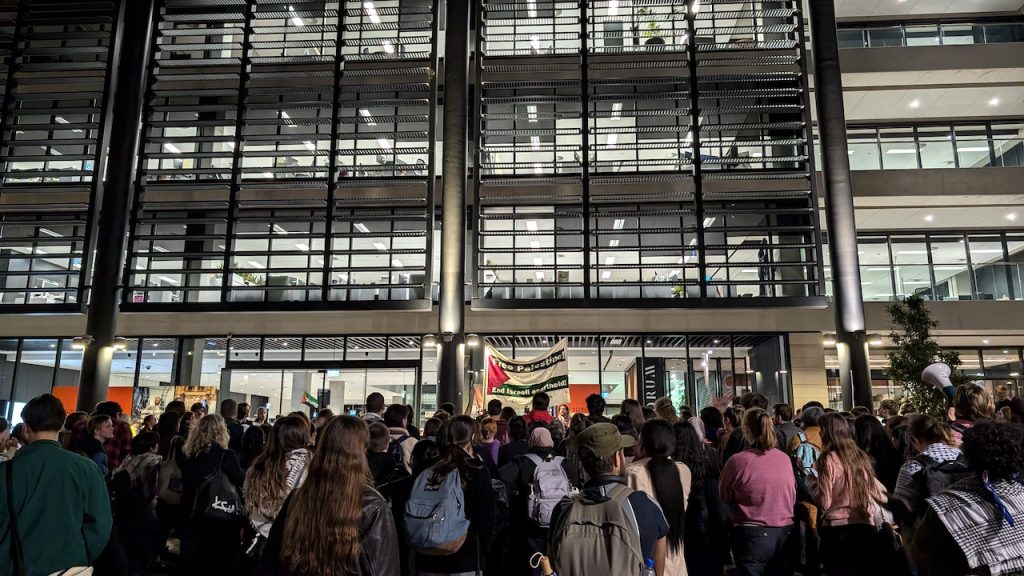
Reactions to the Campus Access Policy
Human rights organisations Amnesty International and the New South Wales Council for Civil Liberties (NSWCCL) have openly criticised the policy.
The NSWCCL released a statement stating they oppose the policy “in the strongest terms,” with President Lydia Shelly demanding its “immediate reversal”.
Amnesty International Australia also “stands in solidarity with student protests” and “urges universities to uphold their campuses as spaces where freedom of expression, academic freedom, and the right to peaceful assembly are embraced, safeguarded, and protected”. It also notes the university’s need to “accommodate spontaneous protests” under the UN Human Rights Committee Principles.
On August 1, the University of Sydney branch of the National Tertiary Education Union (NTEU) held a protest outside F23 Administration Building on Eastern Avenue, specifically addressing the CAP’s obstruction of broader activism related to improving staff conditions and the quality of education.
The Student General Meeting (SGM)
In response to the CAP, Sydney University’s Student Representative Council (SRC) also held a historic Student General Meeting (SGM) at Eastern Avenue Auditorium on Wednesday, August 7. This is the fifth Student General Meeting the USYD SRC has hosted since 1971, with the first held to oppose the Springbok Tour when South Africa was under apartheid.
The meeting saw the passing of two motions, including calls to remove the CAP.
The SRC and Activists
SRC Women’s Officer Rhand Katib, one of the SGM organisers, a Palestinian and a participant in the encampment, said the introduction of the CAP was “proof that the university felt threatened by a strong and genuine voice”.
“Universities have a duty to protect our freedom of speech and our right to protest because this is about future leaders, right here, right now,” she said. “The university prides itself on past encampments against the Vietnam War and mass mobilisations against the Iraq War. It uses these events to market itself but when it’s happening here and now, it’s a different story. I challenge the university to look at its history and present, and face the reality of this.”
SRC Education Officer Grace Street said the CAP will impact the quality of education students receive.
“With so many Arts courses and a focus on global affairs, being told you can’t discuss these topics on university grounds due to the Campus Access Policy is a significant blow to education, freedom of debate, sharing ideas, and connecting with peers and teachers.”
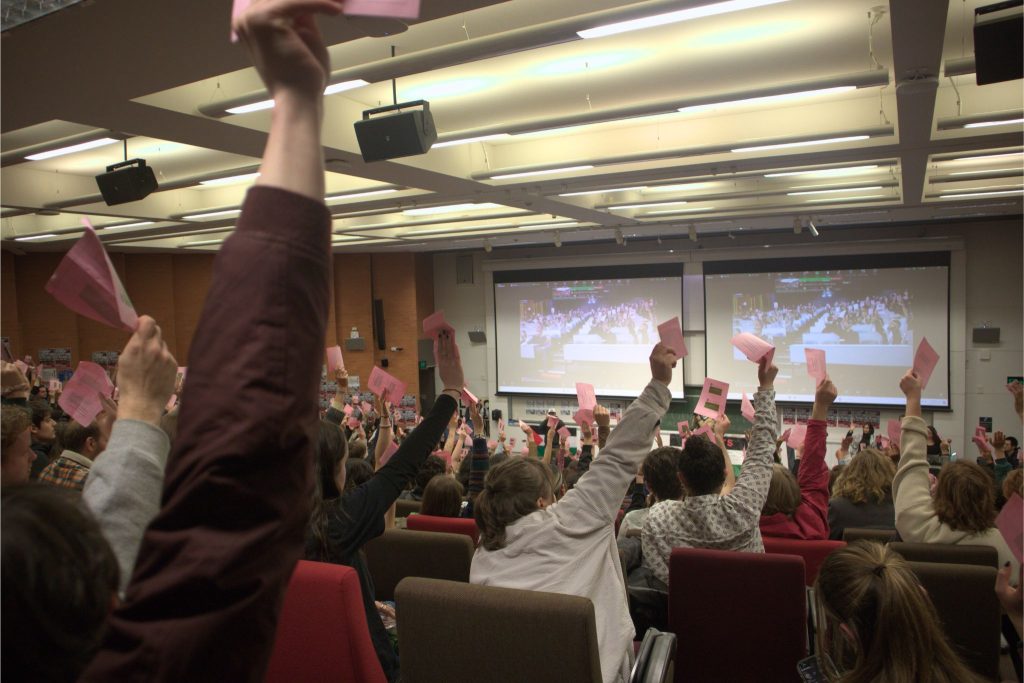
University response
The university released a statement in response stating that “less than one percent of our student population attended the SRC meeting”, and the result of the SGM votes “don’t represent our institutional position nor the majority of our student body”.
It has since declined to comment on how it will safeguard freedom of speech and not use its power to silence student activism and broader movements. On July 24 it released a statement promising “there will be consultation with staff and student groups” on how the CAP has worked at the end of the semester and will “fine-tune as necessary”.
What students think
Some students are deeply concerned that the CAP will stifle student activism, and maybe also other university events.
In her opinion piece, Madeleine Clarke argues the policy grants the administration undue power to silence dissenting voices. She raises concerns about how it will restrict snap rallies—citing the 2021 spontaneous demonstrations that were key to protest against course cuts of the Faculty of Arts and Social Sciences. She also points to the unnecessary red tape the CAP might bring when clubs and societies promote their clubs and events.
Others shared concerns about the CAP on future protests but understand the university’s motives for applying it to the encampment.
“Saying demonstrations don’t require approval but proceeds to restrict every little activity just feels ridiculous and suspicious. It’s like the uni is playing a word game,” a student (who asked to be referred to as CW) said.
The student acknowledged understanding why the university implemented the CAP following the encampment, noting that the rallies “had gotten out of hand” and “diverged from their original purpose”.
“I just don’t think sleeping on the lawn and chanting every day is the most effective way to communicate with the uni or push for change,” CW said. “Doing stuff like blocking City Road and causing inconvenience to people who have nothing to do with the issue doesn’t help the cause. It just pushes people away rather than bringing support.”
Some are completely in favour of the CAP.
“I think Campus Access Policy is necessary. The university has a right to protect its property and maintain order,” another student who asked not to be named said.
“And let’s not forget, we’re paying so much to study. Having protesters come to our classes violates our right to a proper learning environment. Besides, these political movements could make the campus a target for attacks. Why should I be in danger just for coming to uni?”
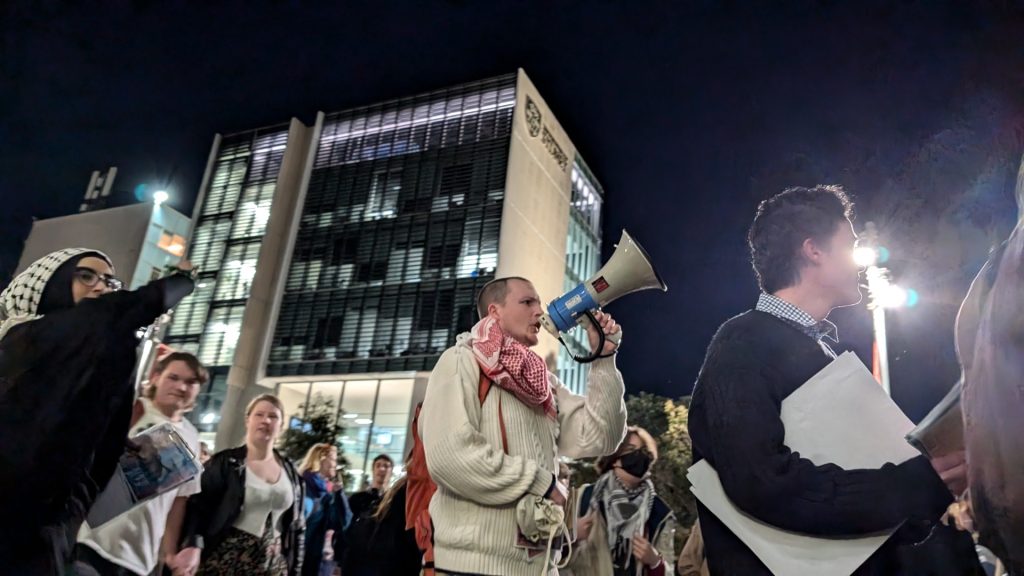
SRC’s Reply
SRC president Harrison Brennan responded in defense of protests on campus. While acknowledging that some students find protests disruptive, he emphasised on-campus protests were “non-disruptive most of the time”.
He said even in cases where protests were disruptive, they’re meant to “disrupt to show the university people are angry”, and “show students that we have more power than we think when united”.
Asked about reports of Jewish students “afraid to go to school” and feeling “intimidated and ostracised” by the encampment, Harrison emphasised that the pro-Palestinian movement on campus is “for everyone”, with many anti-Zionist Jewish students actively participating and leading efforts.
The movement promotes “freedom, equality, and justice for all peoples”, he said, refuting claims it was exclusionary or promoted hate speech. He stressed there were no precedents of on-campus protests leading to hate speech or violence, noting they were all “peaceful”.
Brennan also dismissed concerns that university protests could make the campus a target for terrorist attacks, arguing that “all instances of violent protest and actions have been from the far right” and “not student activism”.
He opposed security and police involvement, arguing “students don’t need police and security to regulate what they can and can’t do”.
“We should condemn any instance where the university is trying to punish students,” he said, suggesting the university’s act of suspending students for peaceful sit-ins also reflects the university’s intentions of using CAP to suppress activism rather than promote safety.
Mark Scott’’s dilemma and what’s next
Brennan, who will hold his position until 1 December 2024, vowed the SRC will “escalate things where possible” if demands are not met. The SRC has since continued to host events speaking out for Palestine and against the CAP.
Others recommended loosening the regulation, such as removing the requirement for protesters to seek approval for using megaphones but retain the 72-hour notice period.
Some suggested modifying the policy to allow spontaneous protest beyond industrial action —even those against the university itself—so it serves its intended purpose to ensure safety, without silencing legitimate student voices or hindering the university’s tradition of activism and debate.
In recent weeks, amid divided opinions within Jewish organisations, Opposition Leader Peter Dutton and Jewish groups like the Zionist Federation of Australia and the Australasian Council of Jewish Students have called for Scott’s resignation, citing his failure to “ensure a safe environment for Jewish students and staff”.
Meanwhile, Peter Wertheim, co-chief executive of the Executive Council of Australian Jewry, the largest umbrella lobby group of more than 200 Jewish organisations defended Scott, arguing his apology has “paved the way for meaningful changes in how the university addresses antisemitism”.
As tensions heighten over the Israel-Gaza conflict, Mark Scott now needs to juggle the demands of pro-Palestinian activists and angry calls over the reversal of the CAP, while addressing safety concerns of Jewish students and responding to students who value a stable, disruption-free campus.
Until a consensus is reached or a solution is found, the flames of protest on USYD campus are far from extinguished, and the battle for voice, safety, and expression rages on.

